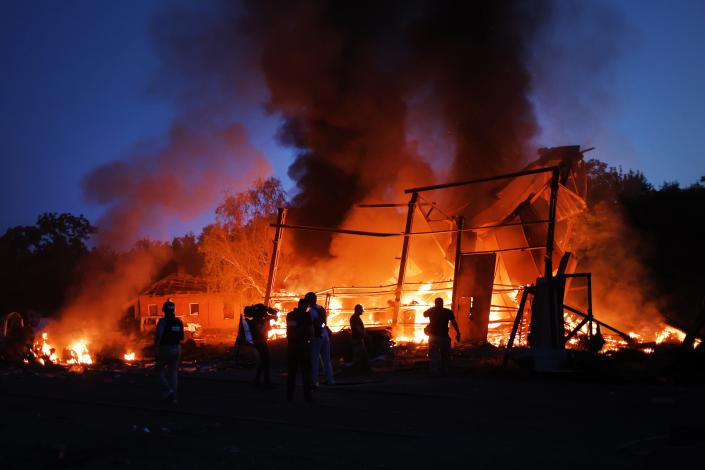
“The enemy of my enemy is my friend,” says an ancient Sanskrit proverb. History has shown it to be a shaky basis for long-term alliances, but in times of conflict, it often makes for strange bedfellows.
We have embraced it most recently in Ukraine’s response to Russia’s invasion.
For most of recent history, Ukraine has been of little interest to us. Even Russia’s 2014 invasion and annexation of Crimea, Ukraine’s southern peninsula, roused little concern. As troops massed at the border for the most recent invasion, we anticipated the worst, but showed mere mild alarm.
We likely thought the outcome was a foregone conclusion. Russia is the largest country on Earth; almost 29 times the size of Ukraine. Its population is 145 million, and its GDP is $1.6 trillion. Ukraine is a weak neighbor with 40 million people and a meager GDP of $1.8 billion, the poorest nation in all of Europe. Its military budget is roughly $6 billion, compared to Russia’s $66 billion or our own $800 billion.


Putin probably anticipated that invading and annexing a couple of more provinces would be a cakewalk. So did the rest of the world. But to our surprise, Ukraine resistance was fierce and effective. Russia’s loss of troops and tanks mounted. Our miIitary strategists heard opportunity knocking.
Despite eclipsing the rest of the world in weapon expenditure, our recent record of military expeditions with boots on the ground has been dismal. We turned tail in defeat in Viet Nam, and simply walked away from two decades of quagmire in Afghanistan. At a cost of $2 trillion and 500,000 lives, we replaced a stable dictatorship in Iraq with chaos and corruption. With good reason, Americans are loathe to send our soldiers abroad for what could turn out to be just another fool’s errand.
But in the memorable words of Wimpy, the faithful sidekick of Popeye in the decades-old cartoon series, “Lets you and him fight.” We have learned to spare ourselves bloodshed and humiliation by simply arming others willing to battle our enemies. If Ukraine is really putting up a fight that promises to diminish Russia’s weapon stockpile and inflict casualties on its troops, then let’s arm Ukraine to keep the battle going.


And so we have, with measurable payoff. So far, we’ve sent about 4,000 of our Javelin anti-tank missiles. At $176,000 each, it is costly support, but the return on investment has been destruction of somewhere between 700 and 1,000 Russian tanks. Ukraine keeps its own score, and claims 1450 tanks, 3500 armored vehicles, 960 artillery and rocket pieces, 213 planes, 180 helicopters and 13 warships. Personally, I suspect they’re cooking the books to keep arms and money flowing from Washington. Whatever the true count, we see this proxy war is damaging Russia and continue our support.
But our shrewd strategies and proxy wars come with a steep humanitarian price. Russia may suffer military casualties and loss of weapons, but the battlefields are in Ukraine. They too lose troops and tanks, but much much more. Shakespeare referred to expendable troops being “food for gunpowder,” and the term canon fodder crept into our lexicon. Today’s wars are fought in streets and alleys, not great battlefields, and cannon fodder today is all too often civilians. The Pentagon’s department of verbal obfuscation tries shifting the term to “collateral damage,” but the meaning is the same: dead people whose misfortune was simply being in the way of war.


nullWe’ve seen the pictures of streaming refugees leaving their homeland, devastated blocks of housing and business, and mothers and children standing in barren streets wondering why their father will never come home. But so long as Russia suffers losses, we seem eager to keep the battles going.
Meanwhile, on the home front we expend great passion extolling the sanctity of life, beginning with the smallest embryo. The loudest shouts come from those professing that divine imperatives undergird their reverence for life. But in reality, we live as though some lives are sacred and some are expendable, and we really want to be the decider.
Without expectations they will actually win, is feeding arms to Ukraine humanitarian aid or another crass example of “lets you and him fight,” and damn the consequences? Humans are a paradoxical species, sometimes rising to heights of nobility and sometimes mired in depravity. I’m trying to figure out which way our needle tilts in Ukraine.
— Community Columnist Dale Wyngarden is a resident of the city of Holland. He can be reached at wyngarden@ameritech.net.
This article originally appeared on The Holland Sentinel: Dale Wyngarden: Is arming Ukraine humanitarian aid or abetting more bloodshed?




